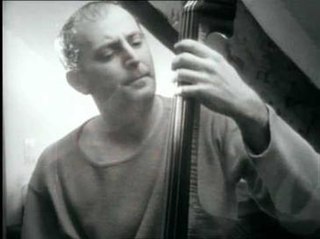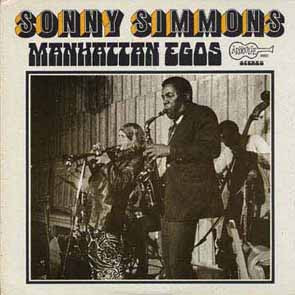Free jazz is a style of avant-garde jazz or an experimental approach to jazz improvisation that developed in the late 1950s and early 1960s when musicians attempted to change or break down jazz conventions, such as regular tempos, tones, and chord changes. Musicians during this period believed that the bebop and modal jazz that had been played before them was too limiting, and became preoccupied with creating something new. The term "free jazz" was drawn from the 1960 Ornette Coleman recording Free Jazz: A Collective Improvisation. Europeans tend to favor the term "free improvisation". Others have used "modern jazz", "creative music", and "art music".

Albert Ayler was an American avant-garde jazz saxophonist, singer and composer.

Donald Eugene Cherry was an American jazz trumpeter. Beginning in the late 1950s, he had a long tenure performing in the bands of saxophonist Ornette Coleman, as on the pioneering free jazz albums The Shape of Jazz to Come (1959) and Free Jazz: A Collective Improvisation (1960). Cherry also collaborated separately with musicians such as John Coltrane, Charlie Haden, Sun Ra, Ed Blackwell, the New York Contemporary Five, and Albert Ayler.

Joe McPhee is an American jazz multi-instrumentalist born in Miami, Florida, a player of tenor, alto, and soprano saxophone, the trumpet, flugelhorn and valve trombone. McPhee grew up in Poughkeepsie, New York, and is most notable for his free jazz work done from the late 1960s to the present day.

James Emory Garrison was an American jazz double bassist. He is best remembered for his association with John Coltrane from 1961 to 1967.

Spiritual Unity is a studio album by American free jazz saxophonist Albert Ayler. It was recorded on July 10, 1964 in New York City, and features bassist Gary Peacock and drummer Sunny Murray. It was the first album recorded for Bernard Stollman's ESP-Disk label, and it brought Ayler to international attention as it was so "shockingly different". At the same time, it transformed ESP-DISK into "a major source for avant-garde jazz". A 5-star review in AllMusic called it a "landmark recording that's essential to any basic understanding of free jazz", "the album that pushed Albert Ayler to the forefront of jazz's avant-garde... really the first available document of Ayler's music that matched him with a group of truly sympathetic musicians", and stated that "the results are a magnificently pure distillation of his aesthetic."

New York Eye and Ear Control is an album of group improvisations recorded in July 1964 by an augmented version of Albert Ayler's group to provide the soundtrack for Michael Snow's film of the same name.
Clifford Edward Thornton III was an American jazz trumpeter, trombonist, political activist, and educator. He played free jazz and avant-garde jazz in the 1960s and '70s.

David Izenzon was an American jazz double bassist.
Norris Jones, better known as Sirone was an American jazz bassist, trombonist, and composer.

Mixed is a compilation album of two avant-garde jazz sessions featuring performances by the Cecil Taylor Unit and the Roswell Rudd Sextet. The album was released on the Impulse! label in 1998 and collects three performances by Taylor with Archie Shepp, Jimmy Lyons, Henry Grimes and Sunny Murray with Ted Curson and Roswell Rudd added on one track which were originally released under Gil Evans' name on Into the Hot (1961). The remaining tracks feature Rudd with Giuseppi Logan, Lewis Worrell, Charlie Haden, Beaver Harris and Robin Kenyatta and were originally released as Everywhere (1966). Essentially these are the three Cecil Taylor tracks from the "Gil Evans album" teamed with Roswell Rudd's Impulse album Everywhere, in its entirety.

Crystals is an album by Sam Rivers released by Impulse! Records in 1974 in a stereo/quadraphonic format.

Spirits is an album by American free jazz saxophonist Albert Ayler recorded in New York City in 1964 and first released on the Danish Debut label then later released on the Freedom label as Witches & Devils.

Ghosts is the second album release by American free jazz saxophonist Albert Ayler's quartet featuring Don Cherry, Gary Peacock and Sonny Murray recorded in Copenhagen in 1964 and first released on the Dutch Debut label then later released on the Freedom label as Vibrations.

Nation Time is a live album by saxophonist and composer Joe McPhee recorded in late 1970 and originally released on the CjR label, then reissued by Atavistic in 2000.

Black Magic Man is a live album by multi-instrumentalist and composer Joe McPhee recorded on December 12, 1970 and was the first album released on the Swiss HatHut label in 1975. It was included, in a heavily extended form, on the "Nation Time" 4-CD box set issued by Corbett vs. Dempsey.

The Copenhagen Tapes is an album by American free jazz saxophonist Albert Ayler consisting of six tracks recorded live at the Club Montmartre in Copenhagen, Denmark on September 3, 1964 plus three tracks recorded in a studio by Danish Radio in Copenhagen on September 10 of the same year. The album was released in 2002 by Ayler Records. The live tracks were also included on disc two of the 2004 compilation album Holy Ghost released by Revenant Records, and were also reissued in 2017 on Copenhagen Live 1964, released by hatOLOGY. In 2016, the three studio tracks were included in the album European Radio Studio Recordings 1964 released by hatOLOGY.

Marzette Watts and Company, also known as Marzette and Company, is the debut album by saxophonist and composer Marzette Watts. It was recorded in December 1966 in New York City, and was released by ESP-Disk in 1968. On the album, Watts is joined by saxophonist, flutist, and bass clarinetist Byard Lancaster, cornetist and trombonist Clifford Thornton, guitarist Sonny Sharrock, vibraphonist Karl Berger, bassists Henry Grimes and Juney Booth, and drummer J. C. Moses. The album, which was reissued by ESP-Disk in 2012, was recorded under the supervision of Clifford Thornton.

Blown Bone is an album by trombonist Roswell Rudd. It was recorded in March 1976 at Blue Rock Studios in New York City, and was released on LP by Philips Japan in 1979. On the album, Rudd is joined by clarinetist Kenny Davern, saxophonists Steve Lacy and Tyrone Washington, trumpeter Enrico Rava, vocalist Sheila Jordan, pianist Patti Bown, guitarist and vocalist Louisiana Red, bassist Wilbur Little, and drummers Jordan Steckel and Paul Motian. The album was reissued on CD by Emanem Records in 2006 with a different track sequence, and with an additional track recorded in 1967 featuring another ensemble.

Manhattan Egos is an album by saxophonist Sonny Simmons. It was recorded at Sierra Sound Studios in Berkeley, California on February 10, 1969, and was released on LP later that year by Arhoolie Records. On the album, Simmons is joined by trumpeter Barbara Donald, bassist and percussionist Juma Sultan, drummer Paul Smith, and conga player Voodoo Bembe. In 2000, Arhoolie reissued the album on CD with four additional tracks recorded live on November 6, 1970, at the Newman Center in Berkeley, California, with Simmons in a quartet that features violinist Michael White, bassist Kenny Jenkins, and drummer Eddie Marshall.

















